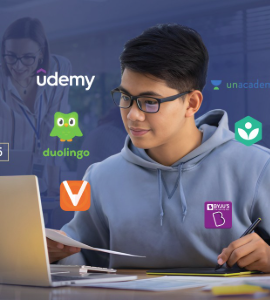As digital learning continues to evolve, having the right tools can make all the difference in how effectively students study online. In 2025, educational apps have become smarter, more personalized, and easier to integrate into daily routines. Whether you’re managing assignments, organizing notes, or collaborating with peers, the right app can enhance productivity and learning outcomes. These tools not only support academic tasks but also promote focus, creativity, and self-discipline.
- Notion – A highly customizable workspace that combines note-taking, task management, and databases. Ideal for students who want to create their own study dashboards, track goals, and organize course materials. With templates for daily schedules, class notes, and revision checklists, Notion allows learners to structure information in a way that suits their individual needs.
- Quizlet – Still a favorite in 2025, Quizlet allows students to create and practice flashcards, access shared sets, and study with engaging learning modes like matching games and timed tests. Its collaborative features let classmates work together, and its AI-powered recommendations offer personalized review paths.
- GrammarlyGO – An AI-powered writing assistant that not only corrects grammar but also helps with tone, clarity, and structure. Great for writing essays, emails, and discussion board posts. In 2025, its integration with Google Docs and learning platforms has made it easier than ever to improve writing fluency in real time.
- Khan Academy – This classic app continues to expand its video lessons and interactive practice exercises. It’s especially helpful for subjects like math, science, economics, and history. The mastery system allows students to learn at their own pace, and the platform now features teacher-assigned tasks and progress tracking.
- Forest – A productivity app that encourages focus by planting virtual trees. The longer you stay off distracting apps, the more your forest grows. It’s perfect for timed study sessions and reducing screen fatigue. In 2025, Forest also includes mindfulness tips and tracks weekly productivity habits.
- Google Keep – A lightweight, flexible app for taking quick notes, setting reminders, and organizing checklists. Syncs with Google Calendar and integrates easily into the Google Workspace. Great for capturing quick ideas during study or setting up to-do lists that stay accessible across devices.
- StudySmarter – Offers a blend of flashcards, notes, and quizzes in one platform. It also provides AI-generated summaries and insights tailored to student goals. Its mobile-friendly interface and learning analytics help users focus on areas needing improvement, making it great for last-minute prep.
- Trello – Great for group projects or organizing multiple subjects. With its visual boards and lists, students can keep track of assignments, deadlines, and resources at a glance. In 2025, Trello’s automation tools and integration with cloud storage make it even more useful for students balancing several classes.
- Duolingo Max – The premium version of the popular language learning app now includes conversational AI, interactive grammar lessons, and real-world context practice for language learners. Duolingo Max helps students develop speaking, listening, reading, and writing skills through an engaging and gamified approach.
- Anki – A top choice for students who use spaced repetition. It’s particularly popular among medical, law, and language students for memorizing large amounts of information over time. Anki’s synchronization across platforms and wide range of downloadable decks make it a versatile and powerful learning tool.
- Evernote – A trusted note-taking app that has evolved with enhanced AI features in 2025. It now suggests content links, tags notes automatically, and allows users to organize research, images, audio, and written notes all in one searchable space.
- Slack for Students – Originally a business communication tool, Slack has been adopted by many schools and universities as a way to organize class discussions, share files, and collaborate in real time. Students use channels to manage different subjects or projects, making academic communication more efficient.
- Coggle – A visual mind-mapping tool that helps students brainstorm, organize concepts, and plan essays or projects. It’s especially helpful for visual learners and group planning sessions.
- Wolfram Alpha – An advanced computational tool that answers math, science, and engineering questions with step-by-step explanations. In 2025, its expanded database and student-friendly features make it a great companion for problem-solving and exam prep.
In summary, the best study apps of 2025 are designed to boost efficiency, support focus, and adapt to each student’s learning style. Choosing the right combination of tools can help students stay organized, motivated, and successful in their academic journey. With so many options available, experimenting with a few to find what works best for your goals and routines is key to building a strong, tech-assisted study system.


